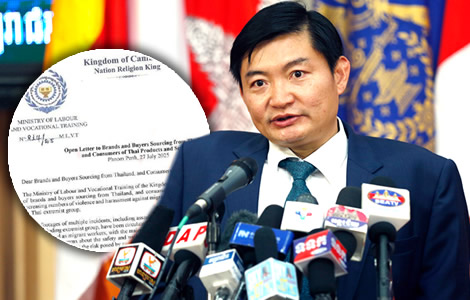Cambodia launches a fierce boycott of Thai goods, accusing Thailand of abusing migrant workers to hit its economy and reputation. Backed by leaked scandals and shadow economies, Cambodia’s multi-front campaign aims to destabilise Thailand politically and economically.
Cambodia struck hard on Tuesday. The Minister of Labour, Heng Sour, launched a full-scale boycott call against Thai products. He accused Thailand of abusing Cambodian migrant workers—an obvious move to destabilise Thailand’s labour market. Even more, it aims to sully Thailand’s reputation in the United States, where the labour movement holds real power over trade decisions. This isn’t just a random protest. It’s a calculated attack. Coupled with Hun Sen’s explosive release of the June 15 phone call with Prime Minister Paetongtarn Shinawatra, Cambodia’s strategy is clear: disrupt and cripple Thailand politically and economically. Cambodia is stepping up its game, using every tool to weaken its neighbour—and the stakes couldn’t be higher.

Cambodia’s Minister of Labour launched a global boycott campaign against Thai goods and services on July 29. The campaign, citing violence against Cambodian migrant workers, marks a dramatic escalation in bilateral tensions. However, this is not simply a humanitarian protest — it is part of a wider, calculated offensive against Thailand.
The Cambodian Labour Ministry’s statement accused Thai extremist groups of carrying out ethnically motivated assaults. Videos of Cambodian workers being attacked circulated online in the days prior. Consequently, the Ministry urged international consumers, brands, and buyers to stop purchasing Thai products and services. It called on companies to ensure non-discrimination and decent working conditions in their Thai-linked supply chains.
Cambodia frames boycott legally citing international labour laws and urges massive migrant worker returns
Moreover, Cambodia framed the boycott in legal terms. The Ministry referenced Thailand’s obligations under the International Labour Organisation (ILO) and the International Organisation for Migration (IOM). These global institutions require member states to protect migrant workers and uphold international labour standards.
Cambodia also cited existing bilateral agreements with Thailand. It argued that Thailand has failed to meet its commitments under regional frameworks. The Ministry declared that “safety, dignity, and fair treatment” must be guaranteed for all Cambodian citizens abroad.
Simultaneously, the Cambodian government issued an urgent advisory for its nationals to return from Thailand. More than 280,000 Cambodian workers reportedly crossed back into Cambodia in the days following the appeal. Labour Minister Heng Sour personally visited Battambang Province to welcome returning workers. He announced that the government had prepared job placements and free vocational training to support their reintegration.
Yet this campaign is more than a response to mistreatment. It comes amid a broader Cambodian strategy to apply pressure on Thailand across multiple domains — diplomatic, political and economic.
Leaked call scandal and border clashes trigger political turmoil as Cambodia escalates multi-front campaign
A key flashpoint came earlier, on June 15, when a leaked phone call between Cambodian Prime Minister Hun Sen and Thai Prime Minister Paetongtarn Shinawatra triggered political fallout in Bangkok. In the call, Hun Sen reportedly offered political advice and backing to Paetongtarn. The leak shocked Thai lawmakers and the public alike.
Soon after, the Thai Constitutional Court suspended Paetongtarn pending an investigation into whether she accepted improper foreign political assistance. This suspension dealt a major blow to the Thai government’s credibility. Cambodia has since moved to exploit the crisis by escalating pressure.
Thailand, meanwhile, faces increasing external and internal strain. Border clashes with Cambodia have flared. Political instability at home continues. And now, a coordinated boycott campaign is threatening Thailand’s international image and trade relationships. Thailand must recognise that it is being targeted in a multi-front campaign.
Economically, Cambodia may be smaller, but it is not powerless. While its GDP is only about 10% the size of Thailand’s, Cambodia’s scammer compound industry gives it unusual leverage. This shadow economy — made up of online fraud networks, gambling rings,and cybercrime hubs — may account for up to 50% of Cambodia’s GDP, according to some estimates.
Cambodia’s scammer compounds fuel economy with Chinese backing despite international crackdowns
This industry is heavily linked to Chinese billionaires and regional crime syndicates. It also overlaps with Cambodia’s casino sector, particularly in areas like Sihanoukville. Despite its illicit nature, the scammer compound economy funds infrastructure, real estate and political patronage networks in Cambodia.
However, the sector has recently come under siege. Thai, U.S., and Chinese law enforcement agencies have begun aggressively cracking down on transnational scams. Thailand, in particular, has taken a leading role in arresting and deporting key figures and tightening border controls. Cambodia views these actions as direct threats to its economic lifeline.
Therefore, the boycott and migrant repatriation campaign must be seen as retaliation. Cambodia is using soft power and legal framing to strike back. It seeks to harm Thailand’s international standing, particularly in Western countries where labour rights advocacy is strong. In the U.S., where unions and rights groups hold sway, this narrative is especially potent.
By painting itself as the victim and Thailand as the oppressor, Cambodia hopes to shift global perception. In doing so, it also appeals to domestic sentiment. Cambodia’s ruling party has long relied on nationalist rhetoric to consolidate power. Framing Thailand as an aggressor reinforces that message.
Cambodia aligns with Chinese investors to support illicit economies and intensifies pressure on Thailand
At the same time, Cambodia continues to align itself with powerful Chinese investors. Many scammer compounds operate with backing from Chinese business networks. Cambodia benefits from this investment, and in return, allows operations that would be illegal elsewhere. These interests are now aligned against Thailand.
Thailand, for its part, must now contend with a multi-pronged challenge. Militarily, it must respond to border instability. Politically, it must manage fallout from the phone call scandal and Paetongtarn’s suspension. Economically, it faces potential losses from boycotts and damaged trade ties. And diplomatically, it must defend its reputation from a growing regional smear campaign.
In this context, a purely military or security-focused response is inadequate. Thailand must adopt a broad national defence posture — one that includes information warfare, labour diplomacy, economic resilience and political unity.
First, Thailand must take control of the migrant worker narrative. That means swiftly investigating and publicly addressing any documented abuses. Partnering with rights groups and NGOs would boost transparency. Upholding fair labour practices at home would help discredit Cambodia’s accusations abroad.
Thailand must restore global confidence and counter cybercrime while stabilising politics and its economy
Second, Thailand must work quickly to restore international confidence. That includes communicating clearly with trade partners, embassies and global media. Thailand must show that it takes international labour law seriously and will hold perpetrators accountable.
Third, Thailand needs to continue countering illegal cyber operations. This effort, while angering Cambodia, is essential for long-term regional security. However, it must also anticipate that further enforcement actions may provoke more diplomatic attacks. Preparedness in the form of counter-narratives and regional coordination is key.
Finally, Thailand must stabilise its domestic politics. The phone call scandal created an opening for foreign interference. A swift and legal resolution — free of factionalism — will close that gap. A unified front is essential when facing a coordinated foreign pressure campaign.
Cambodia’s boycott campaign is a calculated offensive aiming to undermine Thailand’s influence
Certainly, Cambodia’s boycott campaign is not an isolated protest. It is part of a calculated, multi-domain offensive aimed at undermining Thailand’s influence. Cambodia is using labour diplomacy, political disruption and economic retaliation in concert. It is defending its shadow economy, exploiting Thai vulnerabilities and pushing back against international scrutiny.
Thailand now finds itself in a regional chess match. To win, it must think and act strategically — not just reactively. The stakes are not only economic or political. They are about sovereignty, reputation and national stability.
Thailand must speak more boldly and engage foreign media actively to win the information war, says expert
Cambodia’s Hun Sen’s hidden agenda for unprovoked, deadly and destructive actions may involve China
With coordinated, cross-sector defences, Thailand can hold its ground. But it must treat this conflict as the complex and serious confrontation that it truly is.
Join the Thai News forum, follow Thai Examiner on Facebook here
Receive all our stories as they come out on Telegram here
Follow Thai Examiner here
Further reading:
Acting PM travels to Kuala Lumpur for ceasefire talks. Cambodia’s PM Hun Manet to attend amid PR war
Hot War rages on the Thai-Cambodian border following Cambodian troops offensive in Chong Bok area


















